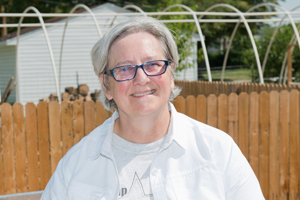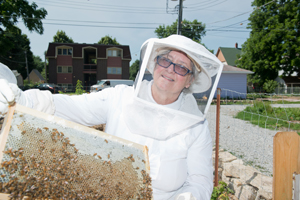Dr. Linda Ruchala is always ready to talk to her students about accounting. As an associate professor at the School of Accountancy in the UNL College of Business Administration, Ruchala knows the importance of hard work to excel academically. Now she is discovering another hard working group through her newest hobby – beekeeping.
Ruchala recently began the practice of beekeeping to expand her environmental horizons.

Dr. Ruchala Takes Up Beekeeping
“I grew up in a suburb area and quite frankly, I didn’t even know anything about gardening until three years ago,” Ruchala said. “My interest in gardening and beekeeping grew out of an overall interest in reducing my environmental impact on the planet.”
The declining number of bees in her own garden is one of the topics that caught her eyes. She became aware that the population of bees is actually suffering from colony collapse disorder. This phenomenon causes the beehive to gradually die out.
“Since bees are a key to the pollination of many plants, trees and flowers, the loss of bee population can be very harmful for gardeners and for food production,” Ruchala said.
Originally from Westland, Mich., Ruchala first worked as a health planner and health manager. The position sparked her interest in how companies make decisions and she soon returned to school to get her doctoral degree in accounting. After she received her degree, Ruchala accepted a job offer from CBA where she has enjoyed teaching for over 20 years.
Last fall, Ruchala took the first step of transforming her concerns for the planet into actions. She signed up for a beekeeping class at Southeast Community College (SCC). The class meets once a month throughout an entire year to talk about a variety of topics such as the lifecycle of bees, basic biological information about bees and how to build a beehive. In April, Ruchala received her first beehive.
Ruchala learned that a typical startup beehive package contains about 10,000 bees and their hives need to be watched closely, especially during winters.
“Once you’ve established the hive, you only need to check on them every three weeks or so to make sure the bees have enough space. During winter though, you would need to check on them more frequently and make sure they have enough food and they are not frozen,” she said.

Linda Ruchala Shows Off Her Hive
Besides the association of hard work between bees and accountancy, there is also an economic similarity when it comes to counting dollars.
“Bees are a pretty valuable commodity and it’s a very good money maker because of the honey they produce. You might not get too much honey the first year of receiving your hive, but if your colony thrives, you can make quite a bit of profit in the following years,” said Ruchala.
As Ruchala learns more about beekeeping, she realizes the importance of having a patient approach that is much the same as balancing the books of any business. Ultimately, that patient attitude is giving Ruchala, and the planet, a more promising future.
Published: July 24, 2012